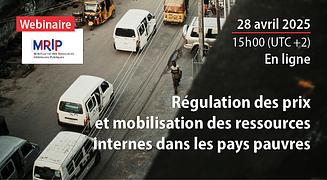
How can price regulation and subsidy policies be reformed in Africa, and how can direct subsidies and implicit subsidies (tax expenditures) be rationalized to boost the mobilization of public resources?
This webinar will look at possible reforms - and their implications - of consumer price regulation policies for energy and basic goods, and tax expenditure policies, applicable to the tax systems of poor African countries.
It will bring together representatives from African countries, donors and international institutions, as well as experts in tax policy in developing countries.
Event in French / English (simultaneous translation).
📅 Monday, 28 April 2025, 3 - 4:30 p.m. (UTC +2)
📍Online webinar, registration required:
https://us02web.zoom.us/webinar/register/WN_QMYcOOqRRIaMihFk7tZUEA
One of the key questions to be addressed at the Seville Conference is how to mobilize the resources needed to finance the Sustainable Development Goals (SDGs). The reforms that governments can undertake to both mobilize more domestic resources and better target and optimize their public spending are an important part of this. In particular, these two objectives are prerequisites for the implementation of ecological transition policies aimed at inclusive development, especially for the most vulnerable populations.
However, tax systems (tax policy and administration) are only one element in the budgetary and broader economic policies of governments to achieve the SDGs. One characteristic of developing countries is their policy of regulating certain markets for goods considered essential (food or oil products).
One of the potential levers for achieving this is to consider the interaction between these policies of regulation and the ability of countries to raise more revenue. The former generally means regulating the prices of the goods in question, which may require explicit or implicit subsidies, notably through tax exemptions. Implicit subsidies are tax expenditures that are little or poorly evaluated, and which significantly restrict governments' ability to raise additional revenue to better target their social policies.
In many developing countries, regulating consumer prices for energy (petroleum products, electricity) and basic foodstuffs can mean costly subsidies that unfairly and inefficiently divert scarce budgetary resources. The vast majority of these subsidies benefit the "biggest" consumers, which can be industries or the wealthiest households. In addition, food subsidies and price regulations expose countries to a long-term dependence on imports, to the detriment of more virtuous local production systems, which are sources of income for rural households. Finally, the legal, regulatory and institutional systems that support subsidies and price regulation are often complex and lacking in transparency. They create a risk of rent-seeking, to the detriment of the effectiveness of public policies.
Despite their shortcomings and unknown total costs, subsidies remain very difficult to reform. They include tax incentives (tax exemptions or tax credits) and social spending (protection of the poorest households). These tax expenditures represent one of the main weaknesses in the mobilization of domestic tax revenues in developing countries, and a potential explanation for their low ratio of tax revenues to GDP.
Subsidies and exemptions are often contested by economists on the grounds of their high budgetary cost, the distortions they introduce and their sometimes anti-redistributive nature, with many of them benefiting the urban and affluent middle classes, or even the elites, rather than the most vulnerable. On the other hand, the political cost of withdrawing these subsidies can be high. How can we try to reconcile these two constraints?
Do you think it would be technically and politically feasible to better target the most vulnerable with cash transfers to compensate for price rises in basic necessities?
Cushioning the consequences of international crises through price regulation mechanisms, combined with explicit or implicit subsidies, is widespread, including in wealthy countries. What alternative mechanisms could be devised to alleviate the consequences of these crises (e.g. strategic cereal reserves in Mauritania during the 2008 crisis)?
Moderator:
Grégoire ROTA-GRAZIOSI, Head of Ferdi's Taxation for Sustainable Development programme, Professor of Economics, University of Clermont-Auvergne, Cerdi
Introductory remarks:
Clarisse SENAYA, Head of the Official development assistance Unit, Directorate general of the Treasury, France
Panelists:
Antoine NKODIA, Economic Advisor to the Minister of Finance, Budget and Public Portfolio, Republic of Congo
Sikassa ESDRAS, Director of Legislation, Litigation and International Tax Relations, Ministry of Finance, Budget and Public Accounts, Republic of Chad
Mario MANSOUR, Head of Division, Tax Policy, Fiscal Affairs Department, IMF
Fati N'ZI-HASSANE, Director, Oxfam Africa